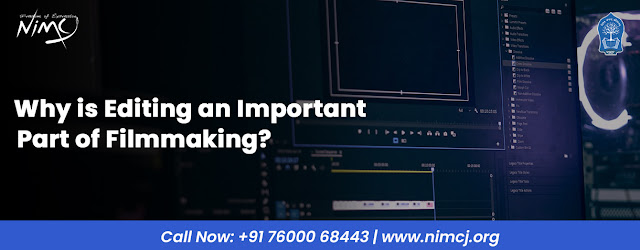Editing is an indispensable and crucial part of filmmaking that plays a significant role in shaping the final product and conveying the intended message to the audience.
Here are some key reasons why editing is essential in the filmmaking process:
Narrative Structure: Editing is the process of selecting, arranging, and trimming the footage captured during filming. It allows filmmakers to structure the story coherently, creating a smooth flow of events that engage the audience and keep them invested in the narrative.
Pacing and Rhythm: Through editing, filmmakers can control the pace and rhythm of the film. The timing of cuts, transitions, and the duration of shots can create various emotional impacts, intensify action scenes, or allow for moments of reflection and contemplation.
Emotional Impact: A well-edited film can evoke a wide range of emotions in the audience. The editing choices, such as close-ups, reaction shots, or montage sequences, can heighten drama, suspense, humor, or other emotional responses.
Continuity and Seamless Storytelling: Editing ensures continuity in the film, maintaining consistency in the visual and audio elements. Smooth transitions between scenes and shots create a seamless storytelling experience that enhances the audience's immersion in the film.
Removing Flaws: Editing allows filmmakers to eliminate mistakes, continuity errors, and unwanted elements from the footage, ensuring a polished and professional final product.
Enhancing Performances: The editing process enables filmmakers to select the best takes from actors' performances and use them to create compelling and impactful sequences.
Adding Visual and Special Effects: In post-production, editors can integrate visual effects, computer-generated imagery (CGI), and other enhancements to elevate the film's visual quality and bring the director's vision to life.
Managing Film Length: Editors have the responsibility to trim and condense the footage to an appropriate length, keeping the audience engaged and preventing the film from becoming tedious or too lengthy.
Collaborative Process: Editing is a collaborative process involving the director, editor, and sometimes other creative team members. It allows for experimentation and refining of ideas, ultimately shaping the film's final version.
Establishing Tone and Style: The editing style, including the use of cuts, transitions, and visual effects, contributes to the overall tone and style of the film, helping to reinforce the filmmaker's artistic vision.
In conclusion, editing is a fundamental aspect of filmmaking that goes beyond simply piecing together footage. It is an art form that empowers filmmakers to craft a compelling story, evoke emotions, and present their vision to the audience in a cohesive and impactful manner. Without skilled editing, even the most well-shot and well-acted film may fail to deliver its intended message and impact the audience as intended.
Ref:

Comments
Post a Comment